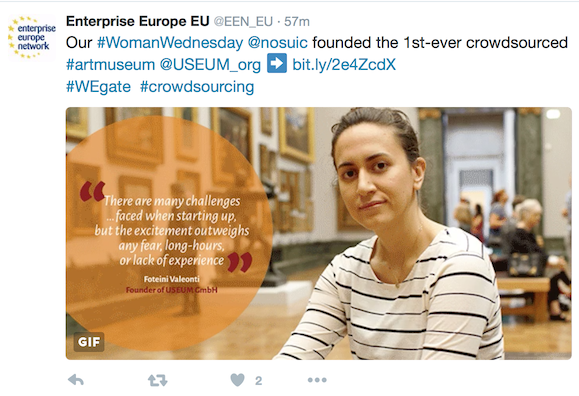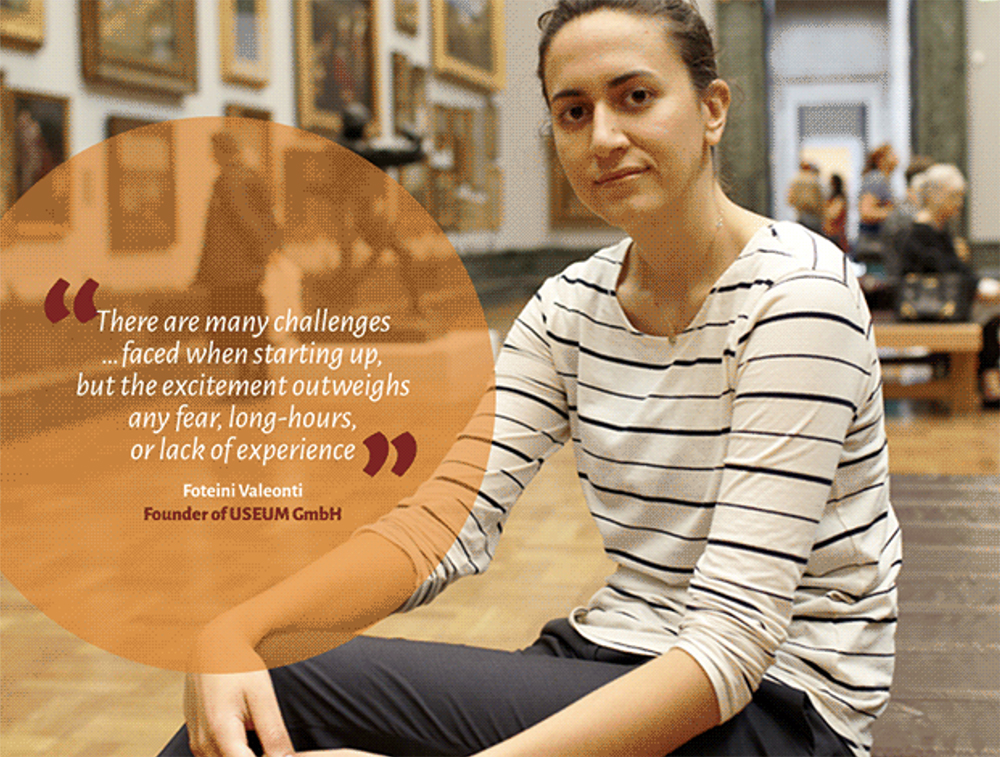Interview about USEUM on the Enterprise Europe Network

Foteini Valeonti, founder of USEUM, had the honour to be interviewed by WEgate, a network promoting women's entrepreneurship in Europe. The interview, which can be found below, was also promoted by the Enterprise Europe Network!

With a background in computer science and interactive digital media, Foteini Valeonti started USEUM during her PhD studies at University College London under the title ‘Making Art more Accessible with Crowdsourcing’. The project benefitted from seed-funding and it is the first-ever crowdsourced art museum. Today, it employs 14 people and WEgate wanted to know how it all started...
WEgate: Can you tell us more about your company?
Foteini Valeonti: USEUM is the World’s Art Museum, a platform aiming to make art accessible and appealing to the average internet user. Its revenue model is through the USEUM Shop, where visitors can purchase premium quality prints and gifts by old masters as well as by contemporary artists from all around the world. USEUM is currently exhibiting 70.000 paintings by 10.000 artists including 2.000 participating artists from 105 countries as well as Old Masters by hundreds of famous museums. The team of USEUM is a total of 14 people and it’s a mixture of full- and part-timers. USEUM’s vision is to become a synonym for painting on the internet, which makes its growth potential limitless.
WEgate: What or who inspired you to set up your own business?
Foteini Valeonti: The person who gave me the decisive “push” and made me realise I wanted to run my own company was my first-ever business mentor, a self-made millionaire who told me that I didn’t need an MBA in order to run a company but instead “the fire in your belly”. He made me believe in myself, at least enough to pursue it.

WEgate: What were the challenges that you faced when you decided to launch your company? Did you have any sort of support from organisations?
Foteini Valeonti: Yes. Being in London and involved with two highly entrepreneurial educational institutions since I moved here, I was supported first by the incubator of Ravensbourne College and then by UCL Advances. USEUM itself started from UCL CASA, as my PhD project and it’s still incubated there. There are many challenges I faced when starting up, but the excitement outweighs any fear, long-hours, or lack of experience. I believe the hardest part comes a bit later on, when you don’t just need to create, but most of the time to maintain. This can be small things, such as maintaining your platform to perform well without any issues and keeping your community of users happy. Or more demanding situations, such as keeping your team-mates and the company’s shareholders happy.
WEgate: Entrepreneurship is still often considered a man's territory; what advice would you give young women who want to become an entrepreneur?
Personally, I was lucky enough not to feel disadvantaged compared to men being a woman entrepreneur and especially a tech entrepreneur, which is an even more male-dominated industry.
Men certainly have the advantage by nature to be more confident in themselves, as Sheryl Sandberg also highlighted in her famous TED talk, and this helps a lot in some respects when acting as the company’s CEO. On the other hand, I believe women are more pragmatic, which I think is vital if you want to found and run a meaningful company long term. I also think we are slightly better communicators, which helps a great deal not only in establishing new business partnerships, but more importantly, in attracting and motivating a great team of capable people.
WEgate: What is your favourite part of your job?
Foteini Valeonti: Working with exceptional people who share the vision of the company you founded years before you met them and who (I sometimes think) believe in your project and want to see it succeed, even more than you do.
"There are many challenges faced when starting up, but the excitement outweighs any fear, long-hours, or lack of experience"
WEgate: Favourite quote/motto?
Foteini Valeonti: My favourite quote is from Jack Ma, the Chinese billionaire founder of Alibaba:
“We know well we haven’t survived because our strategies are farsighted and brilliant, or because our execution is perfect, but because for 15 years we have persevered in our mission […] and because we have insisted that normal people can do extraordinary things.”
[source]
SaveSave
SaveSave
SaveSave
SaveSave